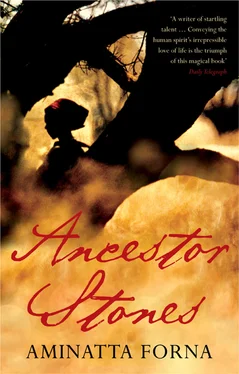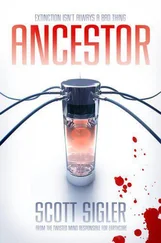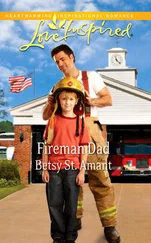‘We are instructed not to allow these boxes to leave our sight until they are properly handed over to be counted.’ Redempta’s voice was steady.
He would have expected us not to give in straight away. He replied smoothly: ‘Well, I am an officer of the Army. You can regard yourselves as having placed the ballot boxes in safe custody.’
‘We cannot do any such thing.’ I spoke up, to show we stood together. ‘We are very clear about our instructions. The boxes must go to the centre to be counted.’
‘Exactly. And that’s where I will make sure they are delivered. Believe me.’
Liar! He would have burned them, emptied them, thrown the ballot papers in the gutter, where they would float down to the sea like paper boats.
We were silent, Redempta and I.
‘Eh bo, aunty.’ His voice was changed now, softer, respectful almost. ‘You’ve done your duty. You can tell that to your grandchildren. Now let me do my own. Look how dark it is already. My men will take care of you, make sure you get home. The streets are unsafe, nobody will come to collect these boxes tonight.’
Neither one of us answered. We both thought this last bit was true. We had been forgotten. It was just us, this man and his soldiers.
‘Get up now. My men will help you.’ The officer switched on his torch and directed the beam at us.
It makes me feel like laughing now to think of the sight we must have made. Two middle-aged women, dishevelled and squinting in the sudden brightness, sitting on the dusty floor of a classroom in our gowns and good shoes, holding on to our handbags. The chain that bound us together went around our waists and then through the handles of the three sealed ballot boxes. The key to the padlock was tucked down Redempta’s bodice. As good as at the bottom of the ocean.
The stand-off could not last for ever, but it lasted just long enough. Minutes later, out of the darkness — the sound of an engine. Yaya! He had spent the day waiting, listening to the nonews coming from the radio, knowing the less that was said the worse things must surely be. When night arrived he collected his car keys and stepped out of the house and drove through the streets, not daring to switch on the headlights, until he reached our polling station. Together we loaded the ballot boxes into the back of the Peugeot under the sullen stares of the soldiers, and though every moment we thought that they might stop us or that some authorisation might arrive to arrest us, deep down we knew we had called their bluff. We were not street boys, but three middleaged citizens. The truth is, once we were no longer afraid, there was nothing they could do.
At the counting centre, Redempta, Yaya and I, we handed over the boxes to a white woman wearing a T-shirt printed with the words: ‘INTERNATIONAL OBSERVER’ in bold letters. And after our mission was complete, we drove home through the dark, silent streets, laughing as we went.
Oh, Redempta! My dear, Redempta. She lived long enough to see how all our efforts had been wasted. Even as we sat chained to our ballot boxes, on the other side of the country people with telltale purple thumbs were having their hands sliced off, to punish them for daring to insist upon their own leader. The Army handed over power with one hand, only to seize it with the other a year later. Old enemies created new factions and joined together against a common foe, us: the women and the children and the ordinary people. The new President, who was an old man, shook his head, climbed into his waiting helicopter and disappeared into the clouds. From those same clouds a maelstrom was unleashed, and of the many lives destroyed by its rage, one was Redempta. Murdered, alongside her husband, her children and countless others, the day the rebel army stormed the city.
I had a dream. In that dream I was playing with my children in the sun, not a cloud in the sky. I looked up, and high above me I saw the ghost of Janneh. From the top of the escarpment he was waving at me and shouting, but he was too far away for me to catch the words, so I smiled and waved back at him. A cloud crossed in front of the sun, for a moment I could hardly see him, I let my hand drop back to my side. Janneh was still calling to me. But it was too late, too late! The gathering winds swept his words away and hurled them out to sea.
And from somewhere in the distance, I heard the first, faint roll of thunder.
Five months earlier I had woken to a dawn the colour of steel. The curious light lasted through the morning and into the day as if the sun had never risen. The land glowed in silvery shades. Here and there pools of quivering light rested upon the side of a house, on the great leaves of the vine that climbed the wall around my yard. In the middle of the day I looked up at the sky expecting to see clouds, instead I saw the sun, a white disc.
A hawk dropped out of the sky and drank from a puddle of water. A superstitious person might have made something of it, otherwise nothing else remarkable happened. My granddaughter had baked black banana bread and she brought me a piece of it on a dish with a glass of water, staying to keep me company. My appetite had waned as I had grown older, and I covered the dish with a cloth, telling her I would enjoy it later. We spoke little, content in each other’s company. I liked simply to watch her liquid movements: flicking a fly with the corner of her dress, fanning her face with her hand, twirling the end of a plait. She sat on the step with one leg stretched out in front of her, the other bent, her cheek resting upon the knee, facing away from me. In the half-light of that day I gazed at the back of her neck, the soft furrow that ran from the nape of her neck down between her shoulder blades; from behind the curve of her waist belied the child she was carrying, just now beginning to show in the roundness of her stomach. With each passing week the birthmark above her navel widened and stretched.
Adama had been eleven years old when her great-grandmother died. Too young to really remember, old enough not to have forgotten. She had loved my mother fearlessly. In a way I had never been able.
When she was three, ignoring Kadie, her own mother, she strode with tiny steps up to her great-grandmother and demanded loudly to be taken to the toilet. My mother threw up her hands and stared aghast, as though she had never cared for a child in her life. Kadie quickly led the child away. But my mother had been amused. The girl called her Ya Mama and sometimes Yammy, and my mother encouraged it.
I know, it’s the oldest story in the world. The fresh spirit who frees one that has been bottled too long.
She had been away when Ya Mama died. And she had appeared to accept it as children do when they have yet to learn the meaning of for ever. Years later she began a game, which she played obsessively for a while. I came to think of it as the ‘remember’ game.
‘Remember when that bird landed on Yammy’s shoulder …’
‘Remember when I made her coffee …’ Mud and river water, mixed together in a tin cup. My mother had been fooled into taking a hearty swig. Later, in the mornings, real cups of coffee just as I had brought to my own grandmother a long time ago. Afternoons, they napped together on the four-poster bed that once belonged to my father.
‘Remember Ya Mama’s feet …’ My mother took care of her feet, soles as smooth as paper, nails dipped weekly in henna. When she could no longer bend to reach them Adama buffed the undersides with pumice.
We would sit for hours sharing memories: fleeting, brightly coloured, sometimes surrounded by darkness, passing them back and forth until I was no longer certain whose were whose. She lent me her own memories of childhood with which to remember my mother.
Читать дальше












